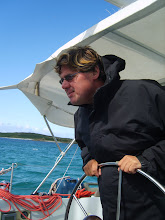An important issue with e-learning projects and projects in general is follow-up. Many good projects stop after a short cycle and its results are rarely used for follow-up projects.
After a walkthrough meeting I attended last year, a very good presentation was made by Maria Kochanska, who hosted the meeting. Her mindmaps are here: http://www.le.ac.uk/beyonddistance/Files/Mind%20map.ppt#256,1,Dia 1 1
One of the conclusions is exactly the same as the topic I address here: We don't try hard enough letting others benefit from our experience. When I suggested yesterday in yet another workshop we use the available knowledge more efficiently by providing a database of people with certain experiences, the replies I got weren't all positive.
Often people are afraid they will become a commodity for too many others. My response to this: it's a market, baby. How are we going to make the results of projects known if the people that were involved in them are afraid to show themselves? And if enough others are interested, what you know becomes valuable and you can price it. And if you really want only to disseminate to very few, price it high.
In e-learning this model has been adopted from the start. Since the folks involved in e-learning are aware of their price, they routinely charge for what they have to offer. This is not all bad, as long as you adopt a balanced strategy. If some of what you learned was publicly funded, it's only fair to charge less to public bodies. Who knows how you'll benefit from what you've shown to others?
An even better model would be to transfer your knowledge to organizations, as they are generally more capable to retain knowledge. But the scale is also important here. Large organizations tend to protect their embedded knowledge stronger so perhaps it's advisable to transfer what you know to people in medium-sized companies or institutions.
Working out a model to distribute costs for knowledge transfer is one of the more poignant tasks, which I feel is certainly worth pursuing. Certainly e-tools are very helpful for this. I'll try to elaborate on this later.
17 Oct 2007
Towards a model of knowledge transfer with e-tools
Labels:
e-learning,
e-leren,
knowledge transfer,
project dissemination
Subscribe to:
Post Comments (Atom)

No comments:
Post a Comment